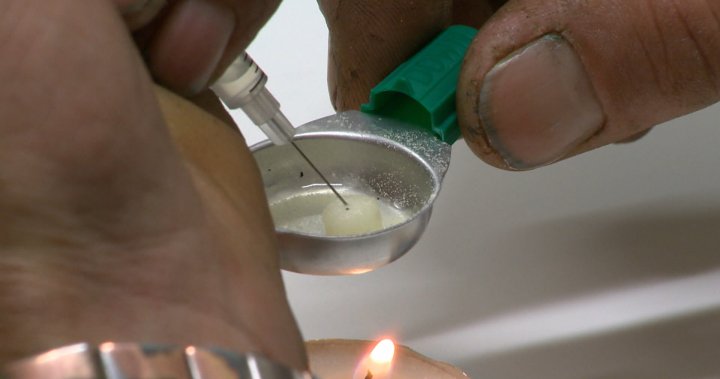As Alberta braces for its controversial new approach to addiction treatment, the provincial government has finally put a name and face to the leadership that will oversee the program. Dr. Eleanor Mitchell, a respected addiction medicine specialist with over 20 years of experience, has been appointed as the inaugural head of Alberta’s Involuntary Drug Treatment Commission.
The announcement came Tuesday afternoon during a press conference at the McDougall Centre in Calgary, where Premier Danielle Smith stood alongside Mental Health and Addiction Minister Dan Williams to unveil their choice to lead what has become one of the province’s most divisive health initiatives.
“Dr. Mitchell brings the perfect balance of clinical expertise and compassionate leadership to this critical role,” said Premier Smith. “Her experience working on the frontlines of our addiction crisis gives her unique insight into what Albertans struggling with severe addiction truly need.”
The commission, established through the Recovery Communities and Addiction Amendment Act passed last fall, will have the authority to detain individuals experiencing severe addiction for up to 90 days of mandatory treatment. The program is scheduled to begin operations in early 2025.
For many Calgarians, the appointment represents a significant step in the UCP government’s shift away from harm reduction toward what they’re calling a “recovery-oriented system of care.” The province has already invested over $200 million in recovery communities and treatment spaces across Alberta.
I’ve spent considerable time covering addiction issues in our city, and I’ve witnessed firsthand how polarizing this approach has become. Walking through parts of downtown or the Beltline, it’s impossible to ignore the human toll of the opioid crisis. Just last week, I spoke with emergency responders who described responding to seven overdoses in a single 12-hour shift.
Dr. Mitchell’s background suggests she’s well-equipped for the challenging road ahead. She previously served as medical director at the Calgary Recovery Centre and has published research on compulsory treatment models in other jurisdictions. Her appointment seems designed to lend medical credibility to a program that has faced significant pushback from civil liberties organizations and many health professionals.
“My goal is to ensure this program becomes a compassionate intervention of last resort for those who have lost the capacity to make decisions due to severe addiction,” Dr. Mitchell said during the announcement. “This isn’t about punishment—it’s about providing a pathway to recovery for those who can no longer find it themselves.”
Critics, however, remain unconvinced. The Alberta Civil Liberties Association has expressed concerns about potential Charter violations, while harm reduction advocates point to research suggesting involuntary treatment often fails to produce sustainable recovery outcomes.
Dr. Hakique Virani, an Edmonton-based addiction medicine specialist, told me in a phone interview that the approach risks further marginalizing vulnerable populations. “The evidence simply doesn’t support this model,” he said. “We know that building therapeutic relationships based on trust and autonomy leads to better outcomes than coercion.”
The appointment comes amid troubling statistics. Alberta recorded 1,841 opioid-related deaths in 2023, according to data from the provincial government’s substance use surveillance system. That’s approximately five Albertans dying every day from drug poisoning.
Minister Williams defended the government’s approach, arguing that traditional voluntary services have failed to reach those most severely impacted. “We can’t continue watching Albertans die while waiting for them to be ‘ready’ for help,” he said. “Sometimes, intervention is necessary to save lives.”
The commission will operate three dedicated treatment facilities—one in Calgary, one in Edmonton, and a third in a location yet to be announced. Each facility will have specialized medical staff, counselors, and social workers to provide comprehensive care during the mandatory treatment period.
For Calgary’s frontline workers, reactions to the news have been mixed. Jennifer Morrison, who runs a community outreach program in the East Village, expressed cautious optimism. “If this creates more treatment spaces and pathways to recovery, that’s positive,” she said. “But the devil will be in the details of implementation.”
The province has committed $45 million to the commission’s operations for its first year, with funding expected to increase as the program expands. Dr. Mitchell will officially begin her role next month, overseeing staff hiring and facility preparations ahead of the 2025 launch.
As this story continues to develop, I’ll be watching closely for details on admission criteria, treatment protocols, and transition planning for those leaving mandatory care. The success of this program will ultimately be measured not by political talking points, but by whether it truly helps Albertans find sustainable recovery while respecting their fundamental rights.
For now, as I look out my office window toward the Sheldon Chumir Health Centre—where countless Calgarians seek addiction services daily—I’m reminded that behind every policy debate are real people facing real struggles. They deserve solutions based on both compassion and evidence. Time will tell if this new commission can deliver on both fronts.







